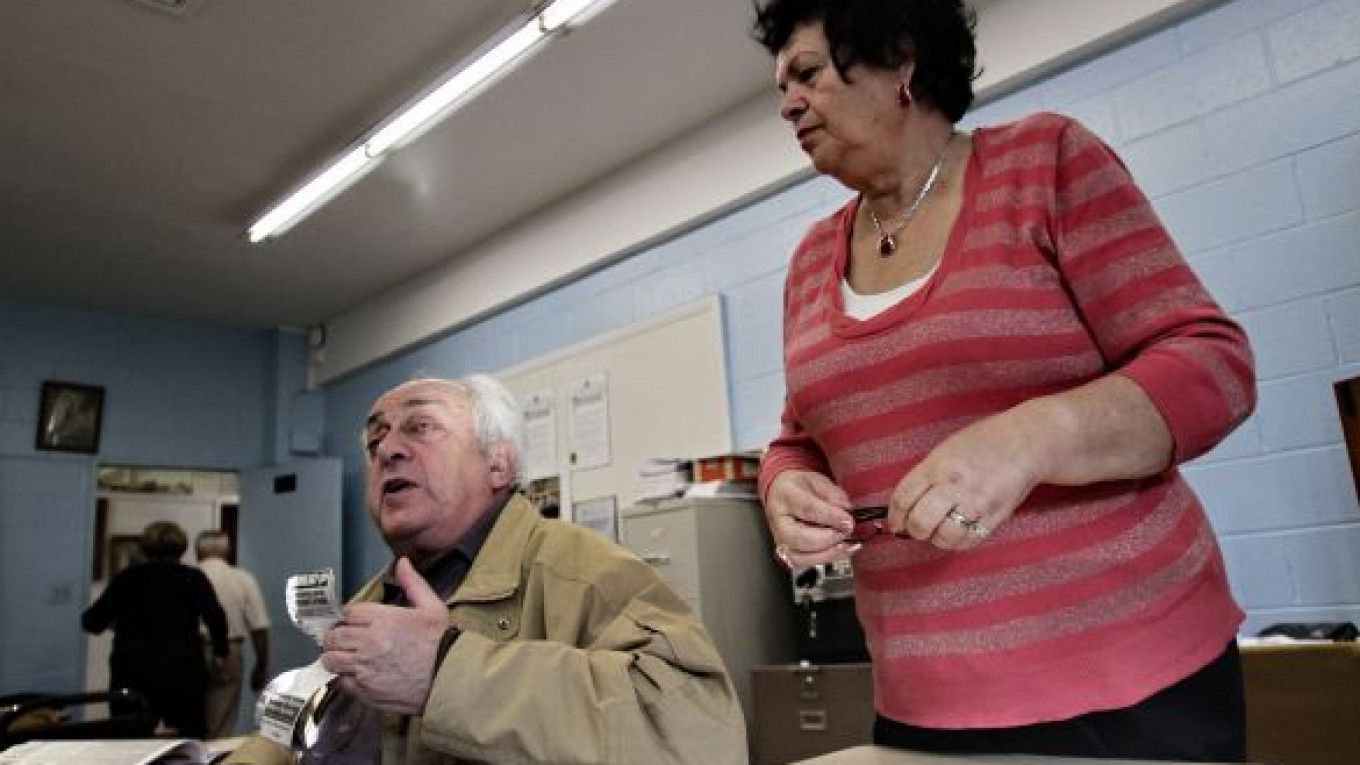NEW YORK — Walk along the boardwalk on a late autumn day, and Brighton Beach can seem like an old-age home by the sea, where stooped ladies wear rouge like armor and almost everyone lives in the shadow of a difficult past.
Along this Brooklyn outpost’s ocean edge — the heart of much community life here — residents are talking about the betrayal they feel after the arrest of 17 people, mostly from Brighton Beach, on charges of faking stories of Holocaust survival to profit from money meant for survivors of Nazi persecution.
“I cannot imagine that someone would lie like that; it’s a terrible crime,” said Klara Rakhlin, 72, her makeup stark against her black, coiffed hair as she speaks in Russian. “I lost my family in a concentration camp, and it’s disgusting that people would get compensation although they haven’t suffered.”
Rakhlin was just a toddler in 1941, when she entered the Pechora concentration camp in what is now Ukraine’s Vinnitsa region. By the time she left in 1944, she was school-aged.
The arrests don’t close the books on the purported scheme. The organization in charge of awarding the money continues to weed through hundreds more case files to see how much further any deception may have spread. Federal prosecutors say they have uncovered more than 5,500 fraudulent claims, many of them containing altered birth dates and faked stories of suffering.
Some people — overwhelmingly residents of this neighborhood and elsewhere in Brooklyn — have received letters informing them that they must either appeal or repay tens of thousands of dollars that the nonprofit group, the Conference on the Jewish Material Claims Against Germany, now believes were wrongly awarded.
Already, more than 90 people have told the Claims Conference, as it is commonly known, that they intend to appeal the cancellation. At least 35 more have returned the money or agreed to repay it on an installment plan.
Still, other recipients are getting letters telling them that their quarterly payments will be rationed out by the month, while the Claims Conference asks them to again detail their stories of persecution and re-evaluates their eligibility. Conference employees will work to find records that confirm each qualifying story, says Greg Schneider, the organization’s executive vice president.
“Ninety-nine percent of the cases are clear cases, and there’s no issue, and we won’t be distracted from the fact that helping survivors is our core mission,” Schneider said of the thousands of applications the group receives each year.
Some community leaders worry that requesting more information from some recipients will again turn survivors into victims.
“They are making survivors suffer even more. Why make them prove their status when they’ve gone through so much already?” asks Pavel Vishnevetsky, director of the Council of Jewish Immigrant Community Organizations.
But Schneider contends that asking survivors to pen a description of their ordeal is not too onerous a task. And the Nazis, he says, were meticulous record keepers — often making it possible to find a paper trail. If someone was on a train transport to a concentration camp, it was recorded. Those trapped in ghettos or who disappeared into hiding can be harder to track down — but if nothing else, records involving someone who witnessed their suffering can usually be found, he said.
Any money claimed wrongly would not have come out of a finite fund for survivors but instead would have come more or less directly from the German government, Schneider said. Lawyers for those accused did not comment. Four of the 17 arrested in the case have pleaded guilty.
For those caught on the other side of the language and cultural divide, the Russian community here can seem closed off.
There are the fairly recent immigrants from the former Soviet Union, who after decades under Communism are often unwilling to talk to outsiders. There are the aging Jews, like Raisa Volokh, who would rather pull a photograph from her wallet to show off her great-grandchildren than speak of her years of starvation in a Ukraine ghetto, the boy who would become her husband suffering the same indignities alongside her.
“The community of Russians, they stay to themselves,” says 96-year-old Lillian Block, who was one of many American-born Jews living here when she moved in in 1941. Now, she says of her neighbors, “they still have the feeling of when they were in the Soviet Union, when everything was so secretive. … It’s very lonely.”
That perception of concealment has led some, in the aftermath of the fraud accusations, to look on this neighborhood with suspicion. Several residents spoke of hearing talk over the years of small-time scams and believing that such behavior could flourish here.
But Schneider warns against passing judgment on this community. While he believes that most or all of the 5,500 allegedly fraudulent claims were made on behalf of real people, he says large numbers of applicants may have been unknowingly involved by unscrupulous middlemen.
A Message from The Moscow Times:
Dear readers,
We are facing unprecedented challenges. Russia's Prosecutor General's Office has designated The Moscow Times as an "undesirable" organization, criminalizing our work and putting our staff at risk of prosecution. This follows our earlier unjust labeling as a "foreign agent."
These actions are direct attempts to silence independent journalism in Russia. The authorities claim our work "discredits the decisions of the Russian leadership." We see things differently: we strive to provide accurate, unbiased reporting on Russia.
We, the journalists of The Moscow Times, refuse to be silenced. But to continue our work, we need your help.
Your support, no matter how small, makes a world of difference. If you can, please support us monthly starting from just $2. It's quick to set up, and every contribution makes a significant impact.
By supporting The Moscow Times, you're defending open, independent journalism in the face of repression. Thank you for standing with us.
Remind me later.






